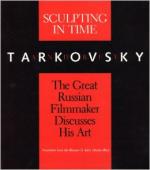
|
| Name: _________________________ | Period: ___________________ |
This test consists of 15 multiple choice questions and 5 short answer questions.
Multiple Choice Questions
1. What Irish novelist and poet, considered to be one of the most influential writers in the modernist avant-garde of the early 20th century, is best known for Ulysses?
(a) Sir Walter Scott.
(b) Samuel Beckett.
(c) James Joyce.
(d) Robert Burns.
2. What term means a statement or proposition that seems self-contradictory or absurd, but in reality expresses a possible truth?
(a) Paradox.
(b) Trigger.
(c) Retreat.
(d) Falsehood.
3. Tarkovsky writes in the Introduction that the public condemned his film Mirror for being "inadmissibly" what?
(a) Slow.
(b) Elitist.
(c) Boring.
(d) Artistic.
4. When was the film, Arrival of a Train at La Ciotat Station, produced?
(a) 1896.
(b) 1880.
(c) 1910.
(d) l951.
5. What refers to the version of a screenplay that is used during the production of a motion picture?
(a) Production script.
(b) Storyboard.
(c) Post-production script.
(d) Shooting script.
6. What was Tarkovsky's first feature film?
(a) Ivan's Childhood.
(b) Nostalgia.
(c) The Killer.
(d) The Sacrifice.
7. When was Tarkovsky born?
(a) 1940.
(b) 1945.
(c) 1951.
(d) 1932.
8. While making which film was Tarkovsky unsure whether his calling was as a film director?
(a) Nostalgia.
(b) The Mirror.
(c) Stalker.
(d) Ivan's Childhood.
9. Tarkovsky states in Chapter III that cause and effect are mutually, what?
(a) Dependent.
(b) Deadly.
(c) Dangerous.
(d) Reactive.
10. Who wrote the book, The Konostasis?
(a) Sergei Eisenstein.
(b) Luis Bunuel.
(c) Andrey Rublyov.
(d) Pavel Florensky.
11. Of what author does Tarkovsky write, "the most interesting characters are outwardly static, but inwardly charged with energy by an overriding passion"?
(a) Bollingsworth.
(b) Hemingway.
(c) Dostoyevsky.
(d) Tolstoy.
12. What is the title of Chapter IV?
(a) The Stalker.
(b) After Nostalgia.
(c) Cinema's Destined Role.
(d) The Beginning.
13. What novelist wrote The Possessed?
(a) Anton Chekhov.
(b) Fyodor Dostoevsky.
(c) Leo Tolstoy.
(d) Alexander Marsh.
14. What Roman poet is best known as the author of the three major collections of erotic poetry: Heroides, Amores, and Ars Amatoria?
(a) Aristophanes.
(b) Homer.
(c) Donovan.
(d) Ovid.
15. What is the title of Chapter II?
(a) Art--A Yearning for the Ideal.
(b) The Responsibility of the Artist.
(c) The Beginning.
(d) Imprinted Time.
Short Answer Questions
1. Tarkovsky writes in the Introduction, "My most fervent wish has always been to be able to speak out in my films, to say everything with total sincerity and without imposing my own ____ on others."
2. In what year did Tarkovsky produce the student film, There Will be No Leave Today?
3. What central character of The Possessed is quoted in the beginning of Chapter III?
4. Tarkovsky concludes the Introduction by stating, "The corpus of theory relating to cinema is still" what?
5. What was the name of Andrey Tarkovsky's father?
|
This section contains 400 words (approx. 2 pages at 300 words per page) |

|




